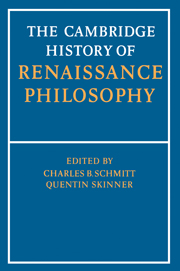Book contents
- Frontmatter
- Introduction
- PART 1 THE INTELLECTUAL CONTEXT
- PART 2 PHILOSOPHY AND ITS PARTS
- 6 Logic and language: Traditional logic
- 7 Logic and language: Humanistic logic
- 8 Natural philosophy: Traditional natural philosophy
- 9 Natural philosophy: The new Philosophy of nature
- 10 Natural philosophy: Astrology and magic
- 11 Moral philosophy
- 12 Political philosophy
- 13 Psychology: The concept of psychology
- 14 Psychology: The organic soul
- 15 Psychology: The intellective soul
- 16 Metaphysics
- 17 Problems of knowledge and action: Fate, fortune, providence and human freedom
- 18 Problems of knowledge and action: Theories of knowledge
- 19 Problems of knowledge and action: Epistemology of the sciences
- 20 Philosophy and humanistic disciplines: Rhetoric and poetics
- 21 Philosophy and humanistic disciplines: The theory of history
- PART 3 SUPPLEMENTARY MATERIAL
- Biobibliographies
- Bibliography
- Index nominun
- Index rerum
- References
11 - Moral philosophy
from PART 2 - PHILOSOPHY AND ITS PARTS
Published online by Cambridge University Press: 28 March 2008
- Frontmatter
- Introduction
- PART 1 THE INTELLECTUAL CONTEXT
- PART 2 PHILOSOPHY AND ITS PARTS
- 6 Logic and language: Traditional logic
- 7 Logic and language: Humanistic logic
- 8 Natural philosophy: Traditional natural philosophy
- 9 Natural philosophy: The new Philosophy of nature
- 10 Natural philosophy: Astrology and magic
- 11 Moral philosophy
- 12 Political philosophy
- 13 Psychology: The concept of psychology
- 14 Psychology: The organic soul
- 15 Psychology: The intellective soul
- 16 Metaphysics
- 17 Problems of knowledge and action: Fate, fortune, providence and human freedom
- 18 Problems of knowledge and action: Theories of knowledge
- 19 Problems of knowledge and action: Epistemology of the sciences
- 20 Philosophy and humanistic disciplines: Rhetoric and poetics
- 21 Philosophy and humanistic disciplines: The theory of history
- PART 3 SUPPLEMENTARY MATERIAL
- Biobibliographies
- Bibliography
- Index nominun
- Index rerum
- References
Summary
THE TRIPARTITE DIVISION OF MORAL PHILOSOPHY
In the Renaissance moral philosophy was divided into three parts: ethics, oeconomics and politics. This division corresponded to Aristotle's Nicomachean Ethics and Politics and the pseudo-Aristotelian Oeconomics, the basic texts used in university teaching of moral philosophy. Aristotle referred in passing to this type of tripartite division, which was later codified and adopted by his Greek commentators as the standard Peripatetic classification of practical philosophy. This tradition, transmitted to medieval Latin philosophy by Boethius and Cassiodorus, is reflected in the classification of sciences presented by Hugh of St Victor and other twelfth-century authors, even though they lacked the Aristotelian texts on which it was based. Dominicus Gundissalinus, for example, in his De divisione philosophiae, written around 1150 and based on both Arabic and Latin sources, divides practical philosophy into the science of governing a state, ruling one's own family and controlling oneself. With the rise of the universities in the thirteenth century and the availability in Latin of the Aristotelian Ethics, Oeconomics and Politics, the triad of ethics, oeconomics and politics became the normal structure for the moral philosophy curriculum.
Renaissance authors continued to follow the tripartite division which they inherited from their medieval predecessors. The traditional scholastic organisation of moral philosophy was used by humanists and philosophers, Aristotelians and Platonists alike. It continued to be a standard feature of moral philosophy treatises and textbooks in the sixteenth and well into the seventeenth century.
- Type
- Chapter
- Information
- The Cambridge History of Renaissance Philosophy , pp. 301 - 386Publisher: Cambridge University PressPrint publication year: 1988
References
- 20
- Cited by



